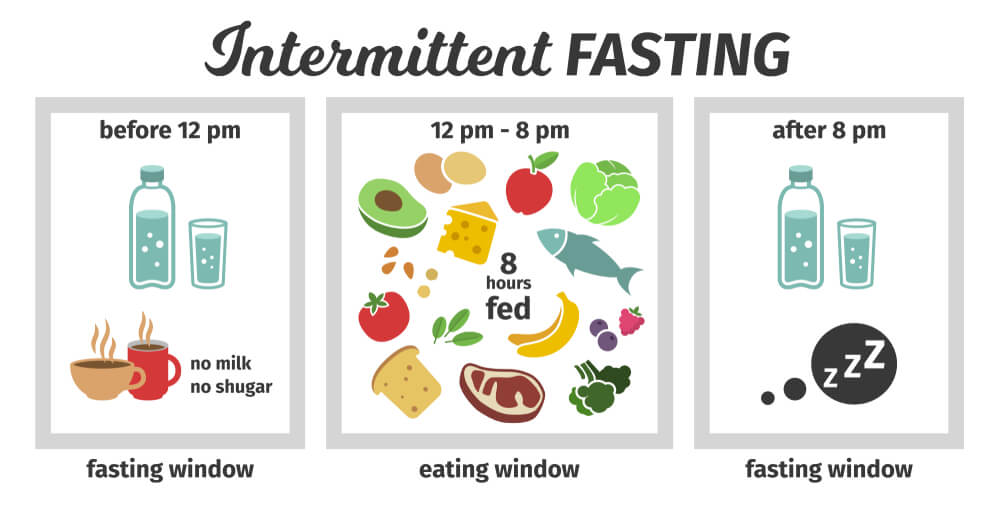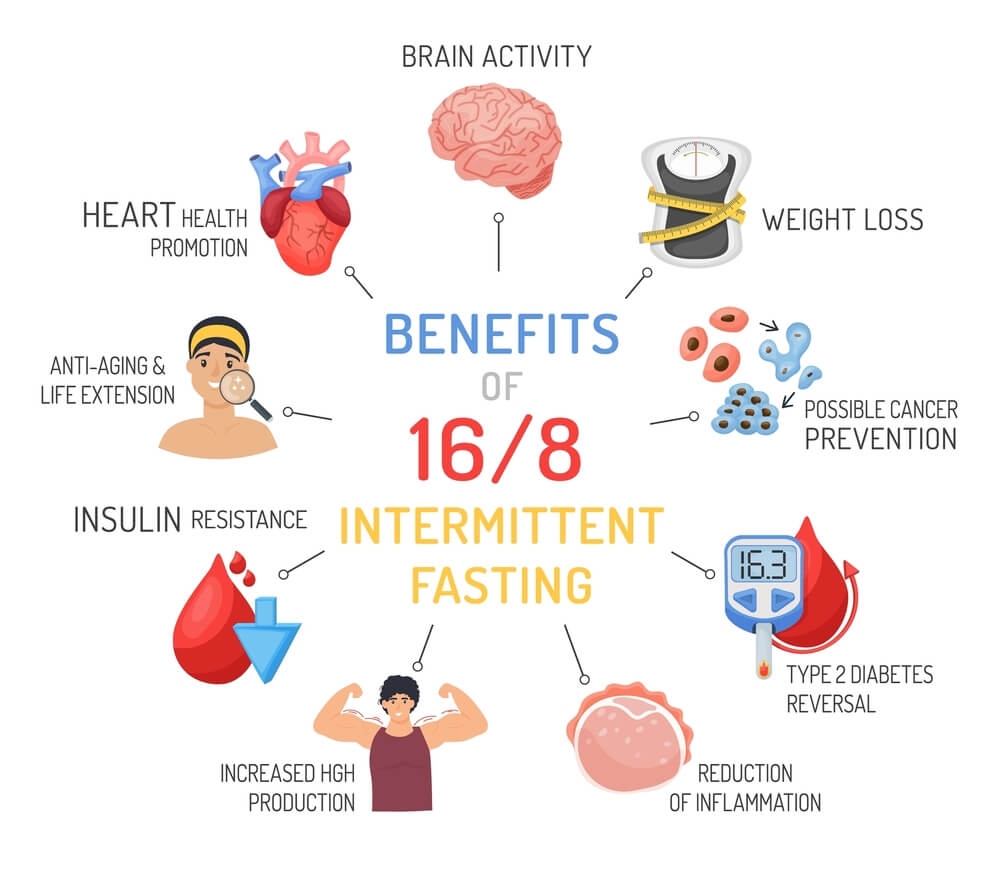Intermittent Fasting for Weight loss: In recent years, people have become increasingly interested in intermittent fasting as a weight loss method. Essentially, intermittent fasting involves alternating between periods of fasting and eating, which can result in reduced caloric intake and increased fat burning. There are various types of intermittent fasting, and it can be tailored to individual preferences and lifestyles.
However, while it can be an effective weight loss tool for some people, it's important to approach it rationally and consider the potential risks and limitations. In this article, we'll delve into what intermittent fasting is, how it works for weight loss, the different types of intermittent fasting, tips for successfully incorporating it into your lifestyle, and potential risks and considerations.
Table of Contents
Definition of Intermittent Fasting
Intermittent fasting involves alternating between periods of eating and fasting. During the fasting periods, no or very little food is consumed, while regular meals are consumed during the eating periods. The goal of intermittent fasting is to limit the time when calories are consumed, which can reduce caloric intake overall.
There are various types of intermittent fasting, ranging from daily time-restricted feeding (such as the 16/8 method, which involves fasting for 16 hours and eating during an 8-hour window) to more extreme forms of fasting (such as the alternate-day fasting method, which involves eating normally one day and fasting the next).
Ultimately, the most appropriate intermittent fasting type will depend on individual preferences and lifestyle factors. The effectiveness of intermittent fasting for weight loss can vary depending on the individual and the type of intermittent fasting practiced.
Recommended: How to Lose 15 Pounds In A Month With and Without Exercise?

How Intermittent Fasting Works for Weight Loss?
Intermittent fasting can help with weight loss in several ways. First, by limiting the time during which calories are consumed, intermittent fasting can help reduce overall caloric intake, resulting in a calorie deficit and subsequent weight loss. Additionally, intermittent fasting can help to increase metabolism, which is the rate at which the body burns calories. This can occur because fasting can lead to an increase in the production of growth hormone and norepinephrine, which can help increase metabolism and burn fat.
Intermittent fasting can also help to improve insulin sensitivity, which is the body's ability to use insulin to regulate blood sugar levels effectively. By improving insulin sensitivity, intermittent fasting can help reduce the amount of insulin needed to regulate blood sugar, reducing the amount of fat stored in the body. Finally, intermittent fasting can help to promote fat burning by increasing the levels of ketones in the body, which are produced during fasting and can help break down stored fat for energy. Overall, intermittent fasting can be an effective weight loss tool for some people by reducing caloric intake, increasing metabolism, improving insulin sensitivity, and promoting fat burning.

Benefits of Intermittent Fasting for Weight Loss
There are several benefits of intermittent fasting for weight loss. These include:
Increased metabolism: Intermittent fasting can help increase metabolism by promoting the production of growth hormone and norepinephrine, which can help burn fat and increase calorie burn.
Decreased caloric intake: By limiting the time during which calories are consumed, intermittent fasting can help reduce overall caloric intake, resulting in a calorie deficit and subsequent weight loss.
Improved insulin sensitivity: Intermittent fasting can help improve insulin sensitivity, which can reduce the amount of insulin needed to regulate blood sugar and the amount of fat stored in the body.
Enhanced fat burning: Intermittent fasting can help promote fat burning by increasing the levels of ketones in the body, which are produced during fasting and can help break down stored fat for energy.
Reduced inflammation: Intermittent fasting can help to reduce inflammation in the body, which is associated with various health conditions and can hinder weight loss efforts.
Intermittent fasting can be an effective weight loss tool for some people by reducing caloric intake, increasing metabolism, improving insulin sensitivity, promoting fat burning, and reducing inflammation. However, it's important to approach intermittent fasting in a balanced way, consider the potential risks and limitations, and consult with a healthcare professional before starting any new diet or exercise regimen.
Different Types of Intermittent Fasting
There are several types of intermittent fasting, each involving alternating between eating and fasting periods. Here are the most common types of intermittent fasting:
Time-Restricted Feeding: This involves limiting the eating window to a certain number of hours per day, such as 8 hours, and fasting for the remaining hours.
Alternate-Day Fasting: It involves fasting every other day, with some versions allowing for a limited number of calories on fasting days.
5:2 Fasting: This involves eating normally for 5 days a week and limiting calorie intake to 500-600 calories for the other two days.
Eat-Stop-Eat: This involves fasting for 24-hours once or twice a week, with no calorie intake during the fasting period.
Warrior Diet: This involves eating one large meal at night and fasting during the day, with some versions allowing for a small amount of food during the fasting period.
It's vital to note that the effectiveness of each type of intermittent fasting can vary depending on individual preferences and lifestyle factors, and it's important to approach intermittent fasting in a balanced way and to consider the potential risks and limitations, as well as to consult with a healthcare professional before starting any new diet or exercise regimen.
See Also: How to Get Thicker Thighs with Easy Exercises & Diet

Tips for Successfully Incorporating Intermittent Fasting into Your Lifestyle
Intermittent fasting can be a powerful weight loss tool, but it can also be challenging to incorporate into your lifestyle. Here are some tips for successfully incorporating intermittent fasting into your routine:
Start gradually: If you're new to intermittent fasting, gradually increase the length of your fasting periods. For example, start with a 12-hour fasting period and gradually work up to a longer fasting period.
Stay hydrated: Drink plenty of water during fasting to stay hydrated and help curb hunger.
Plan your meals: Plan your meals to ensure you get the nutrients you need during your eating periods. Focus on whole, nutrient-dense foods, and avoid processed or high-sugar foods.
Experiment with different fasting schedules: There are several different types of intermittent fasting, so experiment with different schedules to find the one that works best for you.
Stay busy: Keep yourself busy during fasting periods to help distract yourself from hunger. Take a walk, read a book, or work on a project.
Listen to your body: Intermittent fasting isn't for everyone, and it's important to listen to your body and adjust your fasting schedule as needed. If you experience negative side effects or find intermittent fasting isn't sustainable, consider trying a different approach.
Overall, incorporating intermittent fasting into your lifestyle can effectively promote weight loss and improve overall health. By starting gradually, staying hydrated, planning your meals, experimenting with different schedules, staying busy, and listening to your body, you can successfully incorporate intermittent fasting into your routine and achieve your weight loss goals.
Potential Risks and Considerations
While intermittent fasting can be an effective weight loss tool for some people, it's important to consider the potential risks and limitations before starting any new diet or exercise regimen. Here are some potential risks and considerations to keep in mind when it comes to intermittent fasting:
Hunger and cravings: Intermittent fasting can be challenging, and some people may experience increased hunger or cravings during fasting periods.
Nutrient deficiencies: If not planned carefully, intermittent fasting can lead to nutrient deficiencies, especially if nutrient-dense foods are not consumed during eating periods.
Blood sugar issues: Intermittent fasting can affect blood sugar levels, and people with diabetes or other blood sugar issues should consult with a healthcare professional before starting an intermittent fasting regimen.
Eating disorders: Intermittent fasting may not be appropriate for people with a history of eating disorders, as it can trigger disordered eating behaviors.
Medications: Some medications may need to be taken with food, so it's important to consult a healthcare professional before starting an intermittent fasting regimen.
Pregnancy and breast-feeding: Intermittent fasting is not recommended during pregnancy or breastfeeding, as it can affect the nutritional needs of both the mother and the baby.
Overall, while intermittent fasting can be an effective weight loss tool, it's important to approach it in a balanced way, consider the potential risks and limitations, and consult with a healthcare professional before starting any new diet or exercise regimen.
How Many Calories Will I Burn Daily with Intermittent Fasting
Intermittent fasting doesn't necessarily burn calories, as it's more about the timing of meals rather than the number of calories consumed. However, some people naturally consume fewer calories during intermittent fasting periods, which can lead to weight loss and a lower daily calorie intake overall.
The number of calories burned daily with intermittent fasting can vary depending on several factors, including age, gender, weight, activity level, and the specific type of intermittent fasting practiced. It's important to focus on a balanced and nutrient diet during eating periods and to listen to your body's hunger and fullness cues to ensure you get the nutrients and calories you need to support your overall health and well-being.

Conclusion
Intermittent fasting could be an effective weight loss tool for some people, but it's important to approach it balanced and sustainably. By incorporating nutrient-dense whole foods into your eating periods, staying hydrated, and listening to your body's hunger and fullness cues, you can reap the potential benefits of intermittent fasting while minimizing the risks and limitations.
However, it's important to consult a healthcare professional before starting any new diet or exercise regimen, especially if you have underlying health conditions or concerns. Ultimately, the most effective weight loss approach is individualized and sustainable for your unique needs and lifestyle.
Must Read: How Did Gabourey Sidibe Lose 150 Pounds So Quickly?


